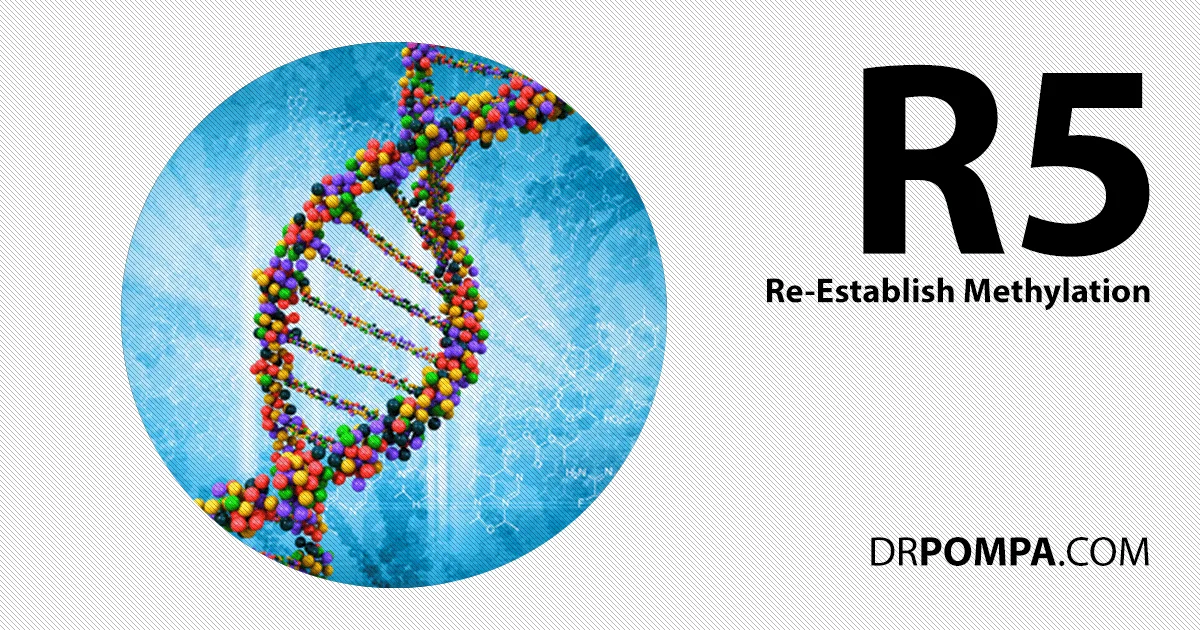R5 – Reestablishing Methylation
Methylation is a process that plays a crucial role in gene regulation and the maintenance of cellular function. It involves adding a methyl group (-CH3) to DNA, which alters the expression of genes without changing their underlying sequence. This process is essential for normal development and plays a critical role in gene expression, genomic stability, and cellular differentiation. However, alterations in DNA methylation patterns have been linked to various diseases.1
Depletion Of Methyl Groups
The depletion of the methyl groups available for methylation have a number of negative effects on our health. Methylation helps to control inflammation in the body. When there is a lack of methyl groups, this leads to an increase in pro-inflammatory markers and chronic inflammation.2
Methylation also plays a role in regulating our immune system. Chronic stress-induced depletion of methyl groups weaken our immune response, making us more vulnerable to illness and disease.3
Methylation is involved in various biochemical reactions that are necessary for energy production. Methylation is important for proper brain function, including controlling neurotransmitter levels and supporting the growth of new neurons. Chronic stress-induced depletion of methyl groups lead to changes in brain structure and function, contributing to mood disorders such as depression and anxiety.4
Reestablishing Methylation – Toxic Estrogen Metabolites
One important aspect of methylation is its ability to modify toxic hormones such as estrogen metabolites. Estrogen is an essential hormone responsible for regulating female reproductive functions and secondary sexual characteristics. However, some metabolic byproducts of estrogen are harmful to the body if not properly eliminated.
Methylation helps convert these toxic estrogen metabolites into less toxic forms that can easily be flushed out of the body. This process protects our cells from DNA damage and reduces the risk of developing hormone-related diseases.5
In addition to detoxifying hormones, methylation also aids in the breakdown and elimination of other toxic substances from our body. This includes environmental toxins, heavy metals, and certain medications.6
Methylation And Heavy Metals
Methylation is a critical process for detoxifying heavy metals from the body. When heavy metals enter the body, they disrupt normal cellular functions and cause damage to tissues and organs. To counteract their harmful effects, our bodies use methylation to convert these metals into less toxic forms that can be easily eliminated through urine.7
In addition to detoxification, methylation also plays a role in protecting against heavy metal toxicity. Methylation helps regulate the expression of genes that are involved in antioxidant defense and repair mechanisms. This is important because heavy metals cause oxidative stress, which damage cells and lead to chronic diseases.8
However, excessive exposure to heavy metals overwhelms the body's methylation capacity, leading to a buildup of toxic forms of these metals. This results in various health problems, including neurological disorders, kidney damage, and developmental delays in children.9
Read more about R1 – Removing The Source Of Toxicity to avoid heavy metal exposure.
Methylation And Genetic Expression
One of the most significant effects of decreased methylation is the activation of “bad” genes. These are genes that should normally be turned off, but due to the lack of methylation, they become active. This leads to the production of abnormal proteins or disruption of important cellular processes.10
Aside from its role in gene regulation, methylation also plays a crucial role in maintaining genomic stability. It helps to protect DNA from damage and prevents errors during DNA replication. When methylation levels are low, there is an increased risk of mutations and genomic instability, which leads to the development of various diseases.11
Reestablishing Methylation – Fat Agouti Gene
One gene that has been extensively studied in relation to methylation is the Agouti gene. This gene is linked to body weight by regulating the production of a signaling molecule called Agouti. However, when this gene is overexpressed, it leads to obesity.
Interestingly, scientists have discovered that the expression of this gene is heavily influenced by environmental factors such as exposure to the toxin BPA. Specifically, exposure to BPA during pregnancy results in epigenetic changes to the gene, leading to its overexpression and adverse health effects in offspring.12
This discovery sparked interest in the possibility of reestablishing methylation patterns on the gene to reverse its negative effects. Researchers have conducted various experiments using dietary supplements, such as folic acid and betaine, which are known to be involved in the methylation process. Interestingly, these studies have shown promising results in reducing the expression of the gene and improving the health of offspring.13
The Connection Between Methylation And Glutathione
Methylation and glutathione are two closely related processes in the human body. Glutathione is an antioxidant that helps protect cells from damage caused by free radicals that we discussed in R3 – Restoring Cellular Energy.
Both methylation and glutathione play important roles in maintaining our overall health. In fact, the two processes are closely intertwined and can have a significant impact on each other. People with methylation issues often have lower levels of glutathione due to impaired methylation pathways.14
One of the key ways that methylation and glutathione are connected is through their role in detoxification. Methylation helps to convert harmful toxins into less harmful substances that can then be eliminated from the body. Glutathione, on the other hand, plays a crucial role in neutralizing and removing toxins from the body. As such, a decrease in either methylation or glutathione levels leads to a buildup of toxins, which have negative effects on our health.15
In addition to their role in detoxification, both processes also play important roles in maintaining proper immune function. Methylation is involved in regulating gene expression and supporting the production of white blood cells, which are vital for fighting off infections and diseases. Glutathione helps to protect immune cells from damage caused by free radicals, allowing them to function effectively.16
Furthermore, both methylation and glutathione have been linked to various health conditions. For example, deficiencies in either process have been associated with autoimmune disorders, cardiovascular disease, and neurological disorders. Additionally, research has shown that certain lifestyle factors, such as stress and poor nutrition, impact both methylation and glutathione levels.17
Homozygous MTHFR Gene And Methylation
One key player in this process of methylation is the MTHFR gene, which codes for an enzyme involved in converting homocysteine to methionine. Variations in the MTHFR gene have been linked to various health conditions, leading to many people undergoing genetic testing to see if they carry these variations.18
Despite the hype surrounding the MTHFR gene, researchers now believe that it may not be as crucial as previously thought. Studies have shown that while certain variations in the gene can affect enzyme function and lead to elevated homocysteine levels, these variations do not significantly impact overall health.19
Instead, the most critical factor in methylation is not the MTHFR gene itself but rather the availability of key nutrients and cofactors needed for proper enzyme function. These include vitamins B2, B6, and B12, folate, choline, and betaine, among others.20
Additionally, lifestyle factors such as diet and stress also play a significant role in methylation. A poor diet lacking in essential nutrients or high levels of stress can disrupt the methylation process and lead to health issues.21
Therefore, instead of solely focusing on the MTHFR gene, it is vital to pay attention to overall methylation status and ensure that the body has all the necessary nutrients for proper function. This can be achieved through a balanced and nutritious diet along with stress management techniques.
Read more about my Cellular Healing Diet that plays a core role in the 5Rs.
Methylation And The Microbiome
Recent studies have shown a close connection between methylation and the microbiome. The microbiome plays a crucial role in regulating methylation patterns in our body. This is because the microbiome produces various metabolites that directly or indirectly affect methylation. For example, short-chain fatty acids (SCFAs) produced by gut bacteria have been found to regulate gene expression through DNA methylation.22
Furthermore, alterations in the microbiome composition have been linked to changes in methylation patterns. Dysbiosis, which is an imbalance in the gut microbiome, has been associated with various health conditions such as inflammatory bowel disease, metabolic disorders, and even mental health disorders. These conditions have also been linked to changes in methylation patterns.23
Studies have also shown that the microbiome affect methylation in other parts of the body besides the gut. For instance, a study found that periodontal bacteria can influence DNA methylation in the oral cavity. This highlights the importance of considering the microbiome when studying methylation patterns.24
Reestablishing Methylation – Reducing Stressors
Stressors, whether they are physical, chemical, or emotional, have a significant impact on our overall health and well-being. The human body is designed to respond to stress through various mechanisms such as the release of hormones like cortisol and adrenaline. These responses are part of our innate fight-or-flight response, designed to help us cope with potential threats. However, when stress becomes chronic or overwhelming, it can have detrimental effects on our physical and mental health.
One of the ways that stress impacts our body is through changes in DNA methylation. Studies have found that individuals who are exposed to chronic stress or trauma tend to have lower levels of DNA methylation. This leads to changes in gene expression, and increases the risk for various health conditions such as cardiovascular disease, autoimmune conditions, and mental health disorders.25
Moreover, research has also linked exposure to environmental toxins and pollutants to changes in DNA methylation. Chemical stressors such as air pollution, pesticides, and heavy metals have been shown to alter DNA methylation patterns, potentially increasing the risk for various health issues.26 27
R5 – Reestablishing Methylation
To support healthy methylation, it is important to maintain a balanced diet rich in nutrients such as B vitamins, folate, magnesium, and antioxidants. Regular exercise and stress management techniques also help to promote optimal methylation.
You made it! That completes the 5Rs of achieving ideal health.
For review, read about any of the 5Rs again. R4 – Reducing Cellular Inflammation, R3 – Restoring Cellular Energy, R2 – Regenerating The Cellular Membrane, and R1 – Removing The Source Of Toxins.
Take the next step to achieving true health and save a seat in my upcoming free training seminar.
References
1 Gouil Q, Keniry A. Latest techniques to study DNA methylation. Essays Biochem. 2019 Dec 20;63(6):639-648. doi: 10.1042/EBC20190027. PMID: 31755932; PMCID: PMC6923321.
2 Bayarsaihan D. Epigenetic mechanisms in inflammation. J Dent Res. 2011 Jan;90(1):9-17. doi: 10.1177/0022034510378683. PMID: 21178119; PMCID: PMC3144097.
3 Calle-Fabregat C, Morante-Palacios O, Ballestar E. Understanding the Relevance of DNA Methylation Changes in Immune Differentiation and Disease. Genes (Basel). 2020 Jan 18;11(1):110. doi: 10.3390/genes11010110. PMID: 31963661; PMCID: PMC7017047.
4 Li M, D'Arcy C, Li X, Zhang T, Joober R, Meng X. What do DNA methylation studies tell us about depression? A systematic review. Transl Psychiatry. 2019 Feb 4;9(1):68. doi: 10.1038/s41398-019-0412-y. PMID: 30718449; PMCID: PMC6362194.
5 Almeida M, Soares M, Fonseca-Moutinho J, Ramalhinho AC, Breitenfeld L. Influence of Estrogenic Metabolic Pathway Genes Polymorphisms on Postmenopausal Breast Cancer Risk. Pharmaceuticals (Basel). 2021 Jan 27;14(2):94. doi: 10.3390/ph14020094. PMID: 33513690; PMCID: PMC7910923.
6 Waly M, Olteanu H, Banerjee R, Choi SW, Mason JB, Parker BS, Sukumar S, Shim S, Sharma A, Benzecry JM, Power-Charnitsky VA, Deth RC. Activation of methionine synthase by insulin-like growth factor-1 and dopamine: a target for neurodevelopmental toxins and thimerosal. Mol Psychiatry. 2004 Apr;9(4):358-70. doi: 10.1038/sj.mp.4001476. PMID: 14745455.
7 Elkin ER, Higgins C, Aung MT, Bakulski KM. Metals Exposures and DNA Methylation: Current Evidence and Future Directions. Curr Environ Health Rep. 2022 Dec;9(4):673-696. doi: 10.1007/s40572-022-00382-4. Epub 2022 Oct 25. PMID: 36282474; PMCID: PMC10082670.
8 Freydenzon A, Nabais MF, Lin T, Williams KL, Wallace L, Henders AK, Blair IP, Wray NR, Pamphlett R, McRae AF. Association between DNA methylation variability and self-reported exposure to heavy metals. Sci Rep. 2022 Jun 22;12(1):10582. doi: 10.1038/s41598-022-13892-w. PMID: 35732753; PMCID: PMC9217962.
9 Vaiserman A, Lushchak O. DNA methylation changes induced by prenatal toxic metal exposure: An overview of epidemiological evidence. Environ Epigenet. 2021 Oct 6;7(1):dvab007. doi: 10.1093/eep/dvab007. PMID: 34631153; PMCID: PMC8493661.
10 Kandi V, Vadakedath S. Effect of DNA Methylation in Various Diseases and the Probable Protective Role of Nutrition: A Mini-Review. Cureus. 2015 Aug 24;7(8):e309. doi: 10.7759/cureus.309. PMID: 26430583; PMCID: PMC4582005.
11 Sriraman A, Debnath TK, Xhemalce B, Miller KM. Making it or breaking it: DNA methylation and genome integrity. Essays Biochem. 2020 Oct 26;64(5):687-703. doi: 10.1042/EBC20200009. PMID: 32808652; PMCID: PMC7606623.
12 Dolinoy DC. The agouti mouse model: an epigenetic biosensor for nutritional and environmental alterations on the fetal epigenome. Nutr Rev. 2008 Aug;66 Suppl 1(Suppl 1):S7-11. doi: 10.1111/j.1753-4887.2008.00056.x. PMID: 18673496; PMCID: PMC2822875.
13 Kadayifci FZ, Zheng S, Pan YX. Molecular Mechanisms Underlying the Link between Diet and DNA Methylation. Int J Mol Sci. 2018 Dec 14;19(12):4055. doi: 10.3390/ijms19124055. PMID: 30558203; PMCID: PMC6320837.
14 Menezo Y, Clement P, Clement A, Elder K. Methylation: An Ineluctable Biochemical and Physiological Process Essential to the Transmission of Life. Int J Mol Sci. 2020 Dec 7;21(23):9311. doi: 10.3390/ijms21239311. PMID: 33297303; PMCID: PMC7730869.
15 Gasmi A, Noor S, Piscopo S, Menzel A. Toxic Metal -Mediated Neurodegradation: A Focus on Glutathione and GST Gene Variants. Arch Razi Inst. 2022 Apr 30;77(2):525-536. doi: 10.22092/ARI.2021.356279.1816. PMID: 36284949; PMCID: PMC9548276.
16 Ferreira AV, Koeken VACM, Matzaraki V, Kostidis S, Alarcon-Barrera JC, de Bree LCJ, Moorlag SJCFM, Mourits VP, Novakovic B, Giera MA, Netea MG, Domínguez-Andrés J. Glutathione Metabolism Contributes to the Induction of Trained Immunity. Cells. 2021 Apr 21;10(5):971. doi: 10.3390/cells10050971. PMID: 33919212; PMCID: PMC8143087.
17 Jin Z, Liu Y. DNA methylation in human diseases. Genes Dis. 2018 Jan 31;5(1):1-8. doi: 10.1016/j.gendis.2018.01.002. PMID: 30258928; PMCID: PMC6147084.
18 Leclerc D, Sibani S, Rozen R. Molecular Biology of Methylenetetrahydrofolate Reductase (MTHFR) and Overview of Mutations/Polymorphisms. In: Madame Curie Bioscience Database [Internet]. Austin (TX): Landes Bioscience; 2000-2013. Available from: https://www.ncbi.nlm.nih.gov/books/NBK6561/
19 Dean L. Methylenetetrahydrofolate Reductase Deficiency. 2012 Mar 8 [Updated 2016 Oct 27]. In: Pratt VM, Scott SA, Pirmohamed M, et al., editors. Medical Genetics Summaries [Internet]. Bethesda (MD): National Center for Biotechnology Information (US); 2012-. Available from: https://www.ncbi.nlm.nih.gov/books/NBK66131/
20 Raghubeer S, Matsha TE. Methylenetetrahydrofolate (MTHFR), the One-Carbon Cycle, and Cardiovascular Risks. Nutrients. 2021 Dec 20;13(12):4562. doi: 10.3390/nu13124562. PMID: 34960114; PMCID: PMC8703276.
21 Barati S, Fabrizio C, Strafella C, Cascella R, Caputo V, Megalizzi D, Peconi C, Mela J, Colantoni L, Caltagirone C, Termine A, Giardina E. Relationship between Nutrition, Lifestyle, and Neurodegenerative Disease: Lessons from ADH1B, CYP1A2 and MTHFR. Genes (Basel). 2022 Aug 22;13(8):1498. doi: 10.3390/genes13081498. PMID: 36011409; PMCID: PMC9408177.
22 Guo W, Zhang Z, Li L, Liang X, Wu Y, Wang X, Ma H, Cheng J, Zhang A, Tang P, Wang CZ, Wan JY, Yao H, Yuan CS. Gut microbiota induces DNA methylation via SCFAs predisposing obesity-prone individuals to diabetes. Pharmacol Res. 2022 Aug;182:106355. doi: 10.1016/j.phrs.2022.106355. Epub 2022 Jul 14. PMID: 35842183.
23 Srivastava S, Singh A, Sandeep K, Yadav D. Epigenetic Regulation of Gut Microbial Dysbiosis. Indian J Microbiol. 2021 Jun;61(2):125-129. doi: 10.1007/s12088-021-00920-y. Epub 2021 Feb 11. PMID: 33612870; PMCID: PMC7877904.
24 Zhao Z, Wang H, Li X, Hou J, Yang Y, Li H. Comprehensive analysis of DNA methylation for periodontitis. Int J Implant Dent. 2022 May 2;8(1):22. doi: 10.1186/s40729-022-00420-8. PMID: 35491409; PMCID: PMC9058047.
25 Vinkers CH, Kalafateli AL, Rutten BP, Kas MJ, Kaminsky Z, Turner JD, Boks MP. Traumatic stress and human DNA methylation: a critical review. Epigenomics. 2015;7(4):593-608. doi: 10.2217/epi.15.11. PMID: 26111031.
26 Rider CF, Carlsten C. Air pollution and DNA methylation: effects of exposure in humans. Clin Epigenetics. 2019 Sep 3;11(1):131. doi: 10.1186/s13148-019-0713-2. PMID: 31481107; PMCID: PMC6724236.
27 Giambò F, Leone GM, Gattuso G, Rizzo R, Cosentino A, Cinà D, Teodoro M, Costa C, Tsatsakis A, Fenga C, Falzone L. Genetic and Epigenetic Alterations Induced by Pesticide Exposure: Integrated Analysis of Gene Expression, microRNA Expression, and DNA Methylation Datasets. Int J Environ Res Public Health. 2021 Aug 17;18(16):8697. doi: 10.3390/ijerph18168697. PMID: 34444445; PMCID: PMC8394939.














